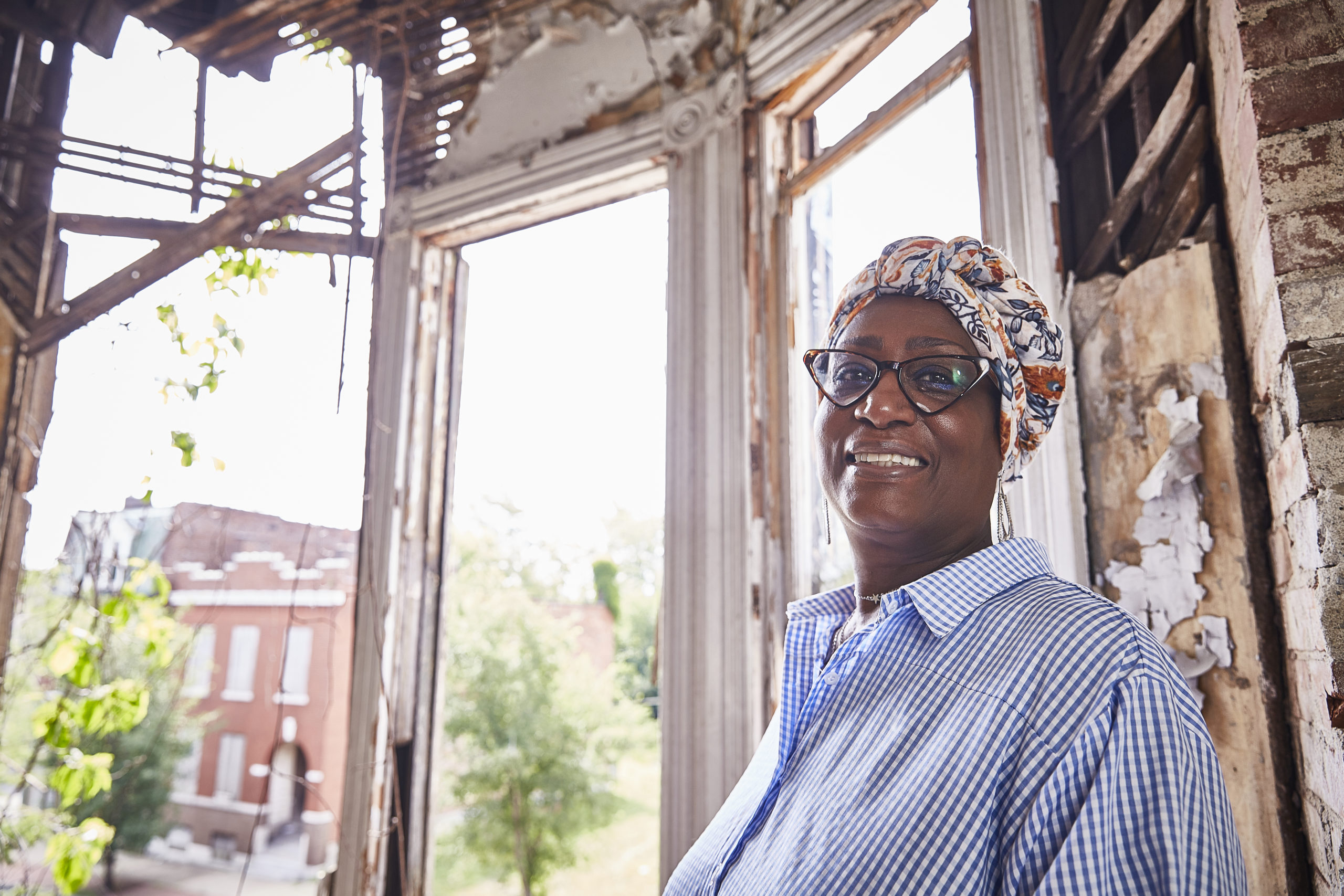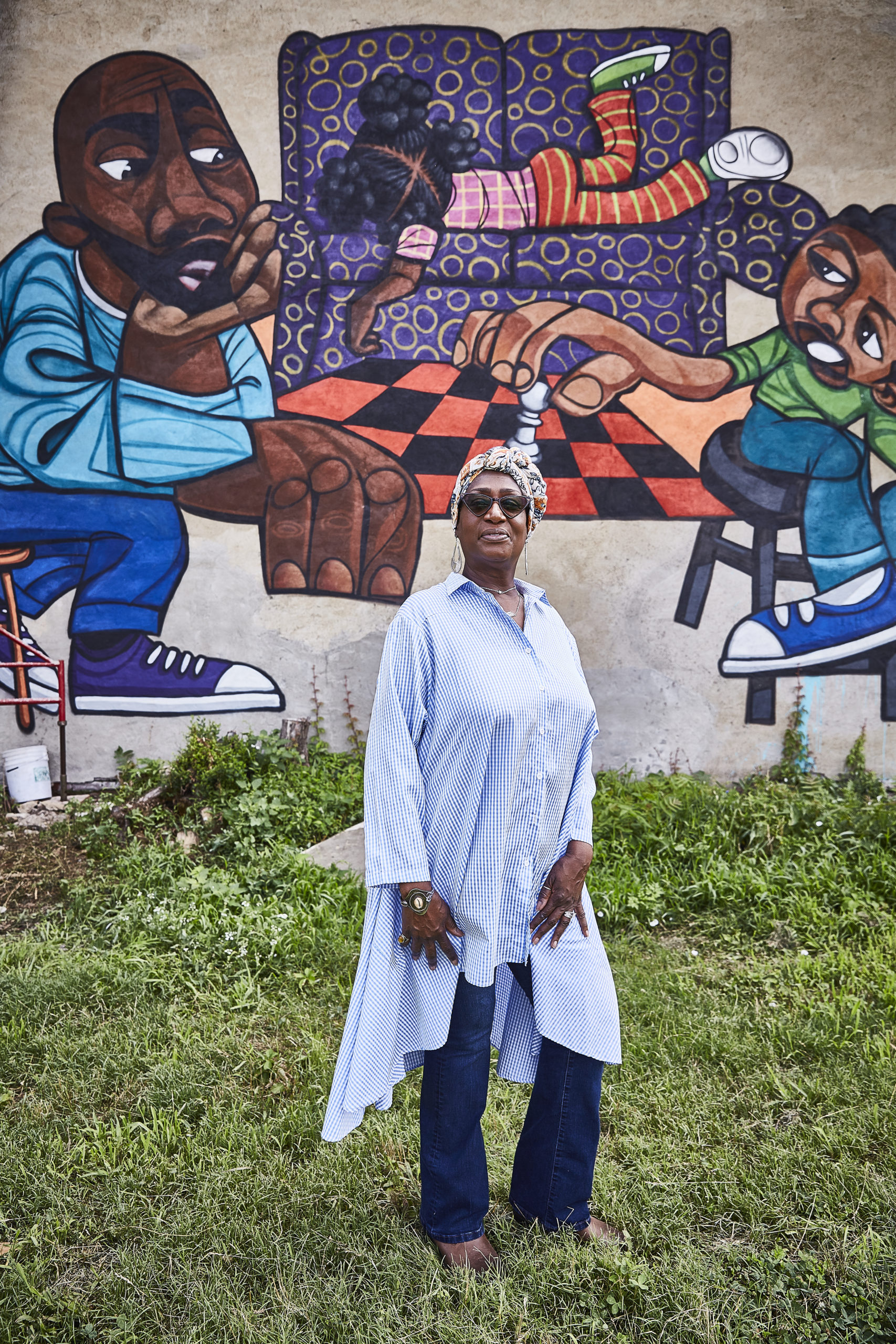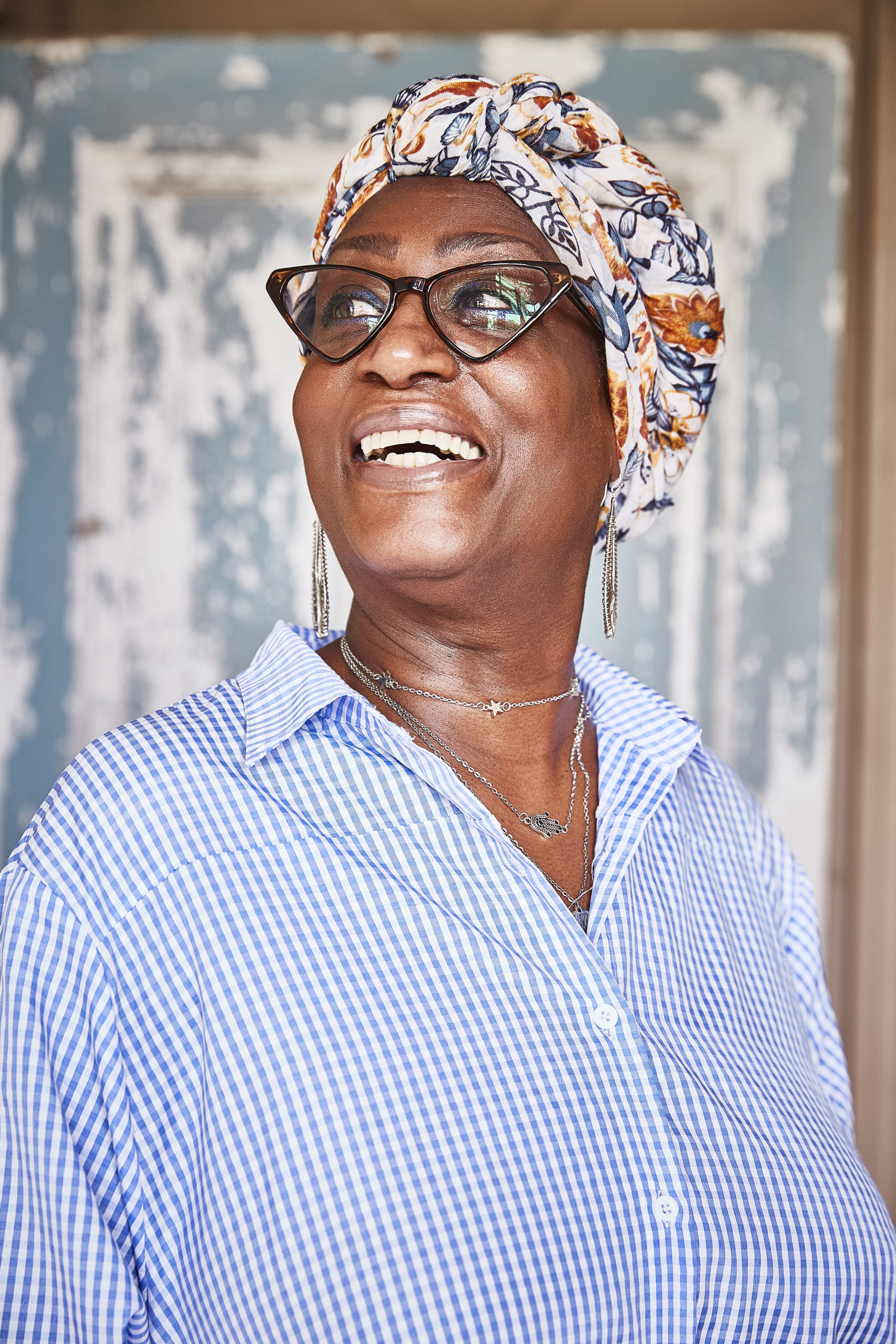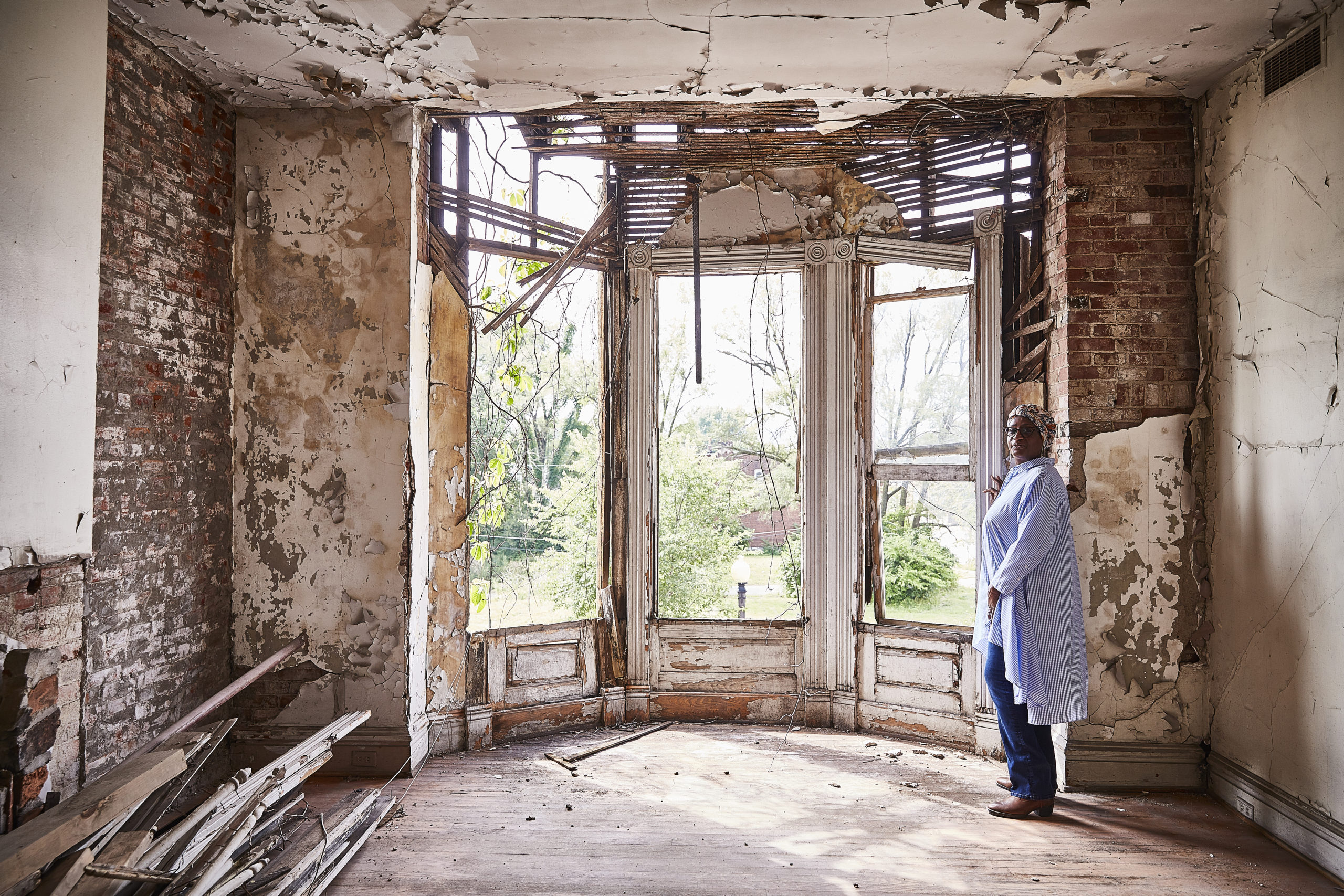A Whole Different Vibration
MARCH 15, 2021
A Whole Different Vibration
by Fatimah Muhammad with Joey Saunders

Entrepreneurialism is in my blood, passed down by my parents and grandparents. My fascination with bees, on the other hand, came about suddenly, almost like I’ve heard poets describe the moment inspiration strikes only, instead of scribbling down rhymes, I found myself spending hours scouring Google, captivated by these buzzing insects. I’d never been especially interested in insects, I never had a phobia or a honey obsession, nor was I intensely environmental. No, my interest simply seemed to fall out of the sky and there I found myself researching these dazzling little creatures. Their bodies have an armored austerity to them, like otherworldly warships painted with caution-tape-vibrant hues of black and yellow. Yet they glide along, with life-affirming pollen clinging to hairs all over their bodies, on delicate, glassy wings with cells and veins like storybook fairies. But, really, it’s their behavior, their commitment to the hive, that hooked me. Most species are eusocial, the most social kind of animal. Each bee so fully dedicates its brief buzzing life’s work to the betterment of its community. I think that’s beautiful. Names are deeply important to me. When it came time for me to name my newest business venture, a cultural coworking, co-living community space, I chose “Apiary,” after the term for a collection of beehives.
I’ll admit, a lifelong St. Louis city-and-suburb-dweller and serial entrepreneur in awe of bees may come across a little odd at first glance, but once you’ve gotten a deeper look into who I am, I think it will click. “Odd” was what they called me early on, too. Teachers, other kids and grown ups. I was compassionate, I don’t think that was all too uncommon in little girls then. Maybe what they found unusual was how intensely my compassion was directed toward my community, my family, my people and all their splendorous Blackness.
I was 8 or 9, running errands with my mom, when a White woman approached. “Well, my word, isn’t she the prettiest little Black girl?”
“Little girl,” I corrected.
The woman flinched, “What?”
“Well, I know I’m beautiful, but what does my color have to do with it?”
“What an odd little girl.”
My mom taught us, “A young woman must be ladylike.” She urged us to always present ourselves with dignity and command respect. I knew what that woman was getting at. She meant I was pretty for a Black girl, like it was its own category that needed to be judged separately from White girls. Pretty in spite of my Blackness, not because. I felt confident that the way I responded was the only way to forge ahead with my dignity intact.

I guess what some found odd, others might have described as rebellious. I must have been between 10 and 12 years old when I wore a Muslim garment to school. I was so excited to swathe myself in such beautiful fabric and show my friends. Genuinely, I was surprised when my teacher said I couldn’t wear it. She thought it was dangerous. Too “ethnic.” The school had a mix of races, but it was still the day and age of having segregated playgrounds and lunch rooms.
“If you don’t take that off your head,” my teacher said, “I’ll have to call your parents.”
“Please call my parents,” I said.
I think she was unfamiliar with parents standing their ground and defending their children. I’m so proud to come from a family that was comfortable with who we were and encouraged me to live authentically. It’s a pride I still carry with me today.
Even my Black and Latinx friends from high school found my intense love and pride for my people and culture a bit odd. They’d point out that everything I did— from my fashion statements to my book reports— was about people of color. It’s not odd to me, it’s what feels not just comfortable but natural. Even today, if I’m talking to a room full of investors I can sense them shift in their seats from time to time when I pitch my business as something unabashedly designed with Black and Brown customers in mind. I have proven that there is power in being successful in business when you treat your culture as an asset, not a liability.
From as early as I can remember, my parents were my role models for cultural pride as well as business savvy and they never sacrificed one for the other. My parents, my seven siblings and I lived in a six room apartment above a chain supermarket called Tom-Boy in what’s now the Wells-Goodfellow neighborhood of North St. Louis City. My father was a wholesaler. He kept a garage behind the building stocked with supplies. Boldly, he opened his own store, Louise’s Confectionary (in honor of my mother’s middle name), right across from the Tom-Boy. He hatched a cunning plan to compete with Tom-Boy’s low prices. My father gathered all these Black business owners and they all put in together to buy inventory in bulk so they were able to qualify for a discount and match or beat Tom-Boy’s prices. My heart still races with pride thinking of how joyfully we celebrated when the competition was too much for them and they closed their doors. Like how David would’ve felt slaying Goliath if, instead of a slingshot, he’d harnessed the power of Black collaboration.
Of course, his most valued collaborator was my mother. She was a stay-at-home mom but also an entrepreneur in her own right. She was a talented seamstress. I wouldn’t come to appreciate the craftsmanship she put into each piece until I was older. Still, I remember thinking I was so eager to be an adult specifically so I could buy clothes. When our teachers, churchgoers, PTA parents, and others around the community complimented my siblings’ and my clothes, they were astonished to learn my mother made all of them. Word spread and she began to sew and sell up a storm. I remember being particularly impressed that she was able to make money without leaving our home.
Eventually we moved from our apartment to a larger home in a neighborhood where we were the second Black family. During those formative years, our eyes were glued to Malcolm X’s and Dr. Martin Luther King Jr.’s protests and civil disobedience. My mother became the first Black woman in our ward to run for Alderperson and win. Race riots erupted in Normandy. It was a surreal time to come of age, especially as a young Black woman.
I remember my high school getting worried, rounding all of us, the Black students, up, putting us into the cafeteria and then on buses home while the White students went about their day. When my father learned this he said, “Oh no, no, no. She is not missing a day of school.” He closed his confectionery early, drove me back to school, and sat in every class with me.

The injustices I witnessed drove me to study law in Nashville at Tennessee State. Quickly, I saw how mired the legal system itself was in injustice. I figured, if I stayed the course I’d be so caught up trying to do the right thing with pro bono work that I would end up broke. I sought out corporate positions that allowed me to do uplifting or supportive work with the community, women, or more vulnerable demographics. Eventually I worked for the City of St. Louis as a minority-owned business certification specialist and contract compliance officer. It was definitely a boys’ club. I was the first woman (and Black woman) and was routinely excluded from or ignored in important conversations. I kept my chin up and, by maintaining honesty, fairness and a hard-nosed dedication to what I felt was right, slowly but surely a mutual respect formed with my contractors and developers.
Those relationships paid dividends for years even after I moved on from that position to a variety of ventures. I opened a holistic metaphysical gift shop in Maplewood. Women loved to just come in, hang out, and take their time getting this or that off their chest while they browsed. Sometimes they’d spend hours browsing and chatting with me before making a purchase. Whether it was the welcoming vibe of the gift shop or the way I wore my compassion so plainly across my face, so many women confided in me stories of abuse. And so many women felt trapped in abusive marriages to wealthy or influential men. They had no plan to escape. Many even reasoned that the lifestyle was worth it, abuse was a toll they felt compelled to pay on the road to glamor. I reacted to this by opening a nonprofit women’s center. As its executive director, I felt like we were able to do a lot of good while nourishing my soul and helping other women; but my father also warned me, “Do something only until it isn’t fun anymore.” Well, this center eventually became too tied to funders who demanded changes to our practices that just weren’t culturally responsive. I decided to shut down the center and move on to a new challenge.
Around this time, my husband and I purchased a 180 year old historic Hyde Park row home and got to work renovating it. Meanwhile, I established myself as a business consulting maven and the owner of a number of ventures, like a specialty boutique catering to women looking for unique pieces. As joyful as this experience was, I noticed a void. I hold my husband, children and grandchildren close. I wanted to spend more time with them and explore other ways to spread joy. So, I made the decision to close my four businesses and retire.
A neighbor came to congratulate me on my retirement and ask what my plans were. I said, my husband and I planned to go to Vegas for a family reunion. The neighbor commented on how involved in the neighborhood I seemed to be, always so vocal, omnipresent at meetings, if there’s a problem on the block, I was sure to get it resolved. The neighbor wondered if I might help the community even more in my retirement and consider running for Alderman.
My husband and I flew to Vegas, I was determined to relax and push the thought from my mind. I don’t remember the lights of the Vegas strip quite as clearly as the green glow of 3:00 AM on the bedside alarm clock when I was lying awake. “You’re going to do it, aren’t you?” My husband smirked. We cut the trip short, I filed, and started campaigning that month.
I fell short by 56 votes, but the experience of canvassing, of talking with a broad swathe of my fellow community members, gifted me with a chance to understand my neighbors and the surrounding community more intimately than I ever had. Initially, my heart grew leaden learning of all the sadness and disparity to which I’d been oblivious. There was so much lack. I wondered if I was part of the problem. If I needed fresh fruit, vegetables, or other staples I jumped in my car and zipped away to an organic grocer that was worth the drive or to shops I frequented in West County.
One woman in particular, a retired US Foreign Service Officer named Regina, told me a story that resonated throughout my soul. She dreamed of owning and operating a catering business serving African cuisine. But she struggled. She lacked the community support system that my cunning father had built. There wasn’t anything like that in our neighborhood. Generally, she told me, our neighborhood lacked any supports for entrepreneurs and small business owners. The effects of red-lining and similar practices compounded over time leading to sprawling disrepair. Banks were unwilling to approve loans in this area. There were no culinary incubators for more than fifteen miles from where we lived. She needed a commercial kitchen to get things up and running. When she finally found a space, it was extremely expensive, she often felt unsafe in the space, and it was so far removed from community that the cultural identity that was the center of her vision was as faint as a wisp of smoke from a dying flame beneath a catering chafer.
That’s when the vision of what would become Apiary @ The Park came buzzing into my mind.
One piece was starting a neighborhood association to bring folks together, understand how, by design, our community was starved of money and services to make certain neighborhoods— Black neighborhoods— decline, and to fight back. To show that there is value in sticking with a neighborhood or choosing to return to a neighborhood specifically to breathe new life into it. To redefine and develop a place on our terms.
The other piece is Apiary @ The Park, a cultural co-working, co-living community space. The idea was pollinated by the swarms of conversations with so many dreamers, like Regina, that I had while canvassing and establishing Hyde Park Neighborhood Association. I hosted listening sessions in my neighborhood to make sure that my community knew how valuable their voices are and that they have a right to know who and what is coming into their community. I also went on listening tours across the North and South Side. It was clear that there was a gap in the market when it came to affordable, culturally responsive spaces especially for startups and burgeoning entrepreneurs of color.
In my years of experience working as a consultant, I’d been meeting clients in a number of co-working spaces even before the term became buzzy. I’m not shy about pointing out that these spaces tend to cater more to straight, White, professional men, especially those in the tech industry. Even most White women I spoke with felt a certain sense of not quite belonging in traditional co-working spaces. On my listening tour, I asked questions to unearth a better understanding of what my community’s co-working space would look like. Hearing from community members filled my imagination with sweetness like a brimful honeycomb. Beyond the stark trappings of a typical co-working space, there could be plenty of natural light pouring into a workshop space for artists and creatives, a wellness space for meditation and yoga practitioners, a cafe that doubles as a venue for community gatherings, a culinary incubator with commercial equipment for upstart caterers and restaurateurs, and a weekly farmer’s market alongside wraparound services and supports. It will be infused with collaborative opportunities and humming with comradery. After all, The Apiary is named for the greatest community builders the animal kingdom has to offer. It is going to have a whole new feel, a whole different vibration.
Before The Apiary was even thought up, my husband and I purchased a space for the neighborhood association, but it was a needlessly large building and too much of a fixer-upper for that project. It seemed like it could be perfect for The Apiary. As I mentioned, I’m passionate about names so I’d already registered the Apiary moniker. I figured, if I named the thing, I’d better make it real, some place I could go to and touch; only I’d never been inside the building so I went over to make certain the space had potential. My husband and I entered the space and scoped out the first two floors. It was clear from the debris and discarded aerosol paint cans that teen tag artists had been gathering there. Then, on the third floor, I was struck by what I saw: a queen bee had been spray painted on a prominent wall. This, I thought, is an affirmation.
As cosmically lovely as it was, affirmations don’t pay the bills. I learned about WEPOWER’s entrepreneur and small business accelerator, WEPOWER Accelerator, that, like my co-working space, was unabashedly designed for Black and Latinx creators and was an opportunity to access much-needed startup capital.
I will admit, as confident as I am with most facets of my identity, I wasn’t sure how my age would be received in the context of an accelerator where everyone else was younger, sometimes by a few generations. I was bracing myself for the possibility that some might say, “Oh, my! What is she doing here?”

That could not have been further from the truth. Being part of the inaugural WEPOWER Accelerator cohort was like being welcomed into a supportive, tight-knit hive of creative minds. The entire experience was brimming with learning and thought-provoking conversations. It probably sounds a little cliche, given my age, but there was so much in terms of website development, technology, digital marketing and that whole section of the curriculum that feels so invaluable now that I don’t know how I managed to successfully run my past businesses without those insights. The connections and coaching I was exposed to was a tremendous help in catapulting my thoughts and business plan to the next level. Truly, the entire experience was priceless. The WEPOWER team and their partners and supporters put on the best program of this kind that I know of.
More than any of it, the camaraderie I experienced, I just cry sometimes thinking about it. I was so touched being in this group that, by week two, all started referring to me as the “Queen Bee.” These people just saw me. It feels so good to be seen. When the program came to an end, everyone had something so kind and meaningful to say.
“I see you. You stand in your power”
“You’re not afraid of being who you are.”
“It is so clear and powerful, the love you have for your people!”
To be surrounded by a cohort of young, intelligent, innovative Black and Latinx men and women was inspiring enough, but to be seen and validated so completely by them, that keeps me going.
These young visionaries I’m honored to call my comrades see the essence of who I am. That essence was forged early in the warmth of my mother’s and father’s love for me above that supermarket all those years ago. And my essence grew steely and unchanging with the cool conviction of my immense and gorgeous value and that of my people. But countless vibrations ripple through a person’s soul in the expanse of their life. Even as we remain ourselves essentially, we shift, gaining and losing identities, experiences, and traits, entire pathways evaporate or rearrange themselves. We change, inevitably. Why shouldn’t our names?
Names, alphabets, letters, they all have vibrations. My dream vibrates like the hum of a honeybee colony, tens of thousands of vibrant, winged alchemists working devotedly to support and strengthen their community, discovering the nectar of life all around them, taking it within themselves and giving it back to their community until their world overflows with golden sweetness. That is why my vision is named Apiary @ The Park. Only it is more than a vision; it is being realized— with the grand opening slated for Winter of 2021— thanks to my essence which vibrates with the entrepreneurialism of my father, the civic healing of my mother and the love and pride we share for our people. If the letters that name you don’t tell your story with their hum, if you’re vibrating in a different sphere, then you’ll feel out of sync with yourself. Names are important.
I have had three names in my 67 years of life. “Fatimah” is an Arabic name. In Islam, she was the youngest daughter of the Prophet Muhammad, The Messenger, peace be upon him. The Prophet is the central Islamic community builder and, in nearly unheard of prominence for a woman in Islam, Fatimah was like his right hand, his nurse and his protector. She’s known even outside of Islamic circles for the symbol that bears her name, The Hand of Fatimah, a representation of great power in seeing, knowledge, and healing. “Fatimah” has been with me for 23 years. It continues to resonate with me. It is the most comfortable name that I have had.
